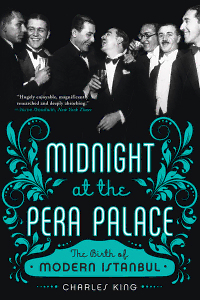Table Of ContentCover Page: v
Title Page: v
Contents Page: ix
Maps Page: xi
Author’s Note Page: xiii
Prologue Page: 1
Grand Hotel Page: 11
The Gray Fleet Page: 29
Occupation Page: 47
Resistance Page: 67
Moscow on the Bosphorus Page: 89
Konstantinoupolis Page: 111
“The Post-War World Was Jazzing” Page: 133
“The Past Is a Wound in My Heart” Page: 153
Modern Times Page: 177
Beyond the Veil Page: 199
Living Like a Squirrel Page: 217
Island Life Page: 233
Queen Page: 253
Holy Wisdom Page: 265
Shadow Wars Page: 287
Paper Trails Page: 315
At the Gate of Felicity Page: 343
Epilogue Page: 367
Acknowledgments Page: 379
Chronology Page: 383
Notes Page: 387
Glossary Page: 423
Bibliography Page: 427
Index Page: 451
Also by Charles King Page: iii
Praise for MIDNIGHT AT THE PERA PALACE Page: iii
Copyright Page: vi
Description:The inspiration for the Netflix series premiering March 3rd "Hugely enjoyable, magnificently researched, and deeply absorbing." —Jason Goodwin, New York Times Book Review At midnight, December 31, 1925, citizens of the newly proclaimed Turkish Republic celebrated the New Year. For the first time ever, they had agreed to use a nationally unified calendar and clock. Yet in Istanbul—an ancient crossroads and Turkey's largest city—people were looking toward an uncertain future. Never purely Turkish, Istanbul was home to generations of Greeks, Armenians, and Jews, as well as Muslims. It welcomed White Russian nobles ousted by the Russian Revolution, Bolshevik assassins on the trail of the exiled Leon Trotsky, German professors, British diplomats, and American entrepreneurs—a multicultural panoply of performers and poets, do-gooders and ne’er-do-wells. During the Second World War, thousands of Jews fleeing occupied Europe found passage through Istanbul, some with the help of the future Pope John XXIII. At the Pera Palace, Istanbul's most luxurious hotel, so many spies mingled in the lobby that the manager posted a sign asking them to relinquish their seats to paying guests. In beguiling prose and rich character portraits, Charles King brings to life a remarkable era when a storied city stumbled into the modern world and reshaped the meaning of cosmopolitanism.

